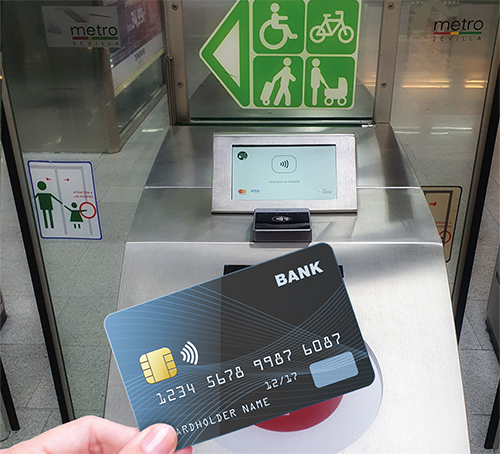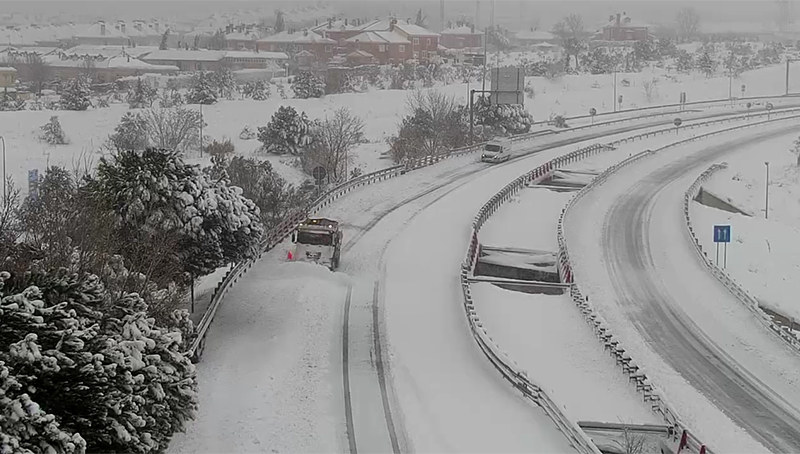Since the beginning of the pandemic, at Globalvia we have focused on keeping all the infrastructures that we manage in the seven countries where we are present operational, as well as on guaranteeing the safety of workers by providing them with the necessary means and equipment. This has been possible thanks to the experience of the management team, the decision-making speed and the commitment and effort of the employees of our company.
Once the worst months of the pandemic were over, we launched several initiatives in order to facilitate the use of infrastructure and safeguard the health of users, as through them, we promote the use of technology as a means of payment on our assets without using cash and cards. These initiatives have been the implementation of the contactless validation and payment system in Metro de Sevilla (Tap&Go) and the launch of the mobile app for toll payments in United States (Slora by Globalvia). Both projects are part of our innovation strategy and, therefore, to offer the best user experience. At Globalvia we plan to implement similar solutions in the rest of the concessions we manage, as long as it is operational to do so.

Tap&Go contactless validation and payment system implemented by Globalvia in Metro de Sevilla.

Slora by Globalvia, mobile app for toll payment in Virginia, USA.
The post-Covid era seems to bring us a new reality that is not yet defined. In the field of transport, there is uncertainty about what the new mobility patterns of users will be like. Covid has had an unprecedented impact on the demand for infrastructures and, although there has been a recovery in recent months, the figures are still far from those registered in 2019. This historic drop in demand is motivated by restrictions of mobility derived from the states of alarm and emergency decreed by the different governments (national and local). The recovery has occurred by easing mobility restrictions, but the 2019 levels have not been reached due to the teleworking modality and the unprecedented economic crisis that we are suffering.
From the area of influence of the concessions that we manage in Globalvia, the objectives achieved during the pandemic are maintained: to guarantee the provision of the service, to safeguard the safety of users and workers and to seek maximum user satisfaction.
Regarding the economic crisis, public-private partnerships are a fundamental tool for investing in infrastructure and, in this way, boosting the economy quickly and efficiently, while improving competitiveness. The public-private partnership model will allow the states to develop infrastructure while avoiding budgetary restrictions and allocate resources to other priorities such as social spending and the reduction of public debt and interest payments.
Given the critical economic situation that lies ahead, it is necessary to quickly define projects to get them started and not delaying the recovery. In this task, private managers such as Globalvia have a lot to provide, since we have the experience and the necessary resources to accelerate the process of defining projects, while we can provide innovative solutions that allow the cost-benefit optimization of the same.
It is worth remembering that public-private partnerships not only generate a short-term benefit through the extra-budgetary financing of projects, but also provide a fiscal return to the state through the payment of taxes in the long term and they guarantee the optimal maintenance of infrastructures, while improving the country’s productive capacity and competitiveness. They also guarantee efficient management of resources and ensure that infrastructures are operational to provide an essential service for society.
This efficient management of resources was endorsed during the impact of the storm Filomena a few weeks ago. In particular in the three concessions that we manage at Globalvia in Madrid: a 14.1 kilometer section of the M-45 ring road, between the O’Donnell axis and the N-II, another section of 11.6 kilometers of the M-407 motorway, between the M-404 and the M-506, and the so-called Ruta de los Pantanos, a 21.8-kilometer stretch on the M-501, between the M-40 and the M -522. In them, it was possible to keep the snow tracks clear using all the machinery and human equipment available in a four-day marathon.

Maintenance teams of Globalvia’s Concesiones de Madrid during Filomena storm.
But for public-private partnerships to be a reality in Spain, the current regulatory framework has to be modified in such a way that investors are allowed to have adequate returns and have greater legal certainty.
Luis Mur Gil – Senior Investment Director
Tribune published in the magazine Cambio 16 “Especial Infraestructuras: Construir después de la pandemia”.
